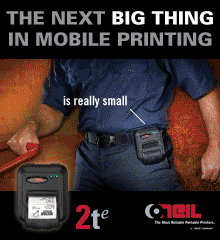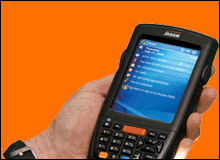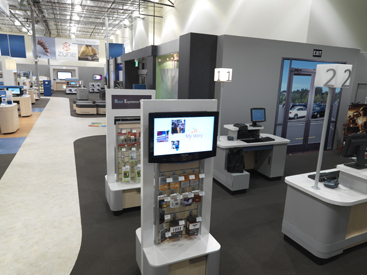
This Week’s Product Pick
Elo TouchSystems (Menlo Park, CA) shipped its 15D1 All-in-One Touch Computer, designed specifically for use in SMB retail and hospitality businesses. Developed from the ground up for POS, according to the company, the 15-inch 15D1 features the Intel Celeron 1.8-GHz processor and support for Microsoft Windows XP, WEPOS, and Vista. The unit’s motherboard, hard drive, and power supply are all accessible and field-replaceable. A broad range of POS peripherals is available from Elo—including perpendicular magnetic-stripe card reader, handheld barcode scanner, fingerprint reader, and customer-facing display—to easily customize the 15D1 for end-user requirements. A range of input/output connection options allows virtually any POS configuration and the unit’s compact footprint has been sized to match standard cash drawers. For customers who require more storage capabilities, an additional 80-GB hard drive can be added. Finally, hard drive, cable management capabilities, and spill-resistant housing ensure long functional life. “Our customers wanted a small footprint touch computer that combined industry-leading performance with the strong value they know Elo TouchSystems can deliver, coupled with field-serviceability and more connectivity options,” noted Gary Sadamori, Elo Marketing Manager. “We’re confident the 15D1 will exceed even our most exacting customers’ expectations.”
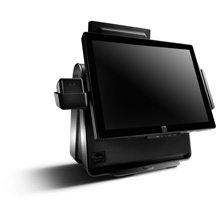
15D1 All-in-One from Elo TouchSystems
COMPANY BUSINESS PCI Compliance for ScanSource’s SSVT ScanSource (Greenville, SC) has announced that its ScanSource VirtualTechnician (SSVT) remote monitoring and management tool for POS has become PCI-certified (to Payment Card Industry Data Security Standards) for processing credit and debit cards. SSVT thus becomes the only retail-focused remote monitoring and remote control tool to carry this certification, according to the distributor. ScanSource’s SSVT is powered by Total Support Manager technology from Vigilix, which is also based in Greenville. “It was important to us to invest in this audit process and have SSVT PCI-certified,” stated Jeff Yelton, President of ScanSource POS & Barcoding. “By offering the only PCI-certified remote monitoring and management tool, we are able to reduce the burden for our reseller partners as they strive to deliver compliant solutions to their end-user customers. We’re committed to doing anything we can to help add value to our reseller partners and make their jobs easier.” Added Andre Nataf, Strategic and Multi-Unit Manager for Menusoft Systems (Springfield, VA), one of ScanSource’s software partners: “PCI compliance is perhaps one of the most important issues for our resellers protecting their clients and themselves. ScanSource VirtualTechnician has been an invaluable solution for protecting our resellers’ customers from hardware and operating system failure and now, with the addition of PCI compliance, it becomes a ‘can’t go without’ tool. If I were a reseller, I would have it installed in every location I serviced.”
Microsoft Wields Next-Generation WEPOS Microsoft took the opportunity of the NRF Show in New York City last week to announce the general availability of its Windows Embedded POSReady 2009, the next generation of the Windows Embedded for Point of Service (POS) operating system. With built-in networking capabilities and standards-based plug-and-lay support, the new platform works seamlessly with a broad range of POS form factors, peripherals, servers, and retail applications, according to Microsoft. OEMs and enterprises can customize the operating system to suit specific hardware requirements and lower cost. New storage options are addressed, as well as integration with USB devices. “In an increasingly connected world, retail and hospitality businesses need technologies that help the transition from transaction processing to enhanced customer service and relationship building,” observed Ilya Bukshteyn, Senior Director of Windows Embedded Marketing at Microsoft. “Windows Embedded POSReady 2009 is designed specifically to help this transition. With Windows technologies such as Microsoft Silverlight, .NET Framework 3.5, and Windows Presentation Foundation, the platform enables a differentiated and compelling user experience that can lead to greater customer loyalty.” Microsoft also announced its new Retail Experience Center, located at the company’s headquarters in Redmond, WA. The 20,000-square-foot facility addresses both Microsoft’s consumer merchandising efforts and role as technology provider to the retail industry. It features two dozen cutting-edge technologies and partner solutions in its fully functioning, interactive store environment, which spans point of service, the receiving dock, and virtually everything in-between related to Microsoft. This spans hardware, software platforms, and content. Tours of the new facility are conducted by invitation only for Microsoft customers and partners. Bill Gonzalez, GM, Worldwide Distribution and Services Sector for Microsoft, commented: “Through the immersive setting of the Retail Experience Center, our retail customers can emerge with an in-depth sense of how software and innovations can help them rise above competitive pressures and industry regulations to create a customer-driven operation—one that consistently delivers a differentiated customer experience across multiple channels while empowering employees to make every square foot of retail space as profitable and productive as possible.”
|
Worth Your While
FS/TEC 2009
(Foodservice Technology Exposition)
Nation’s Restaurant News
February 4-7
Orlando
AIM Technology Leadership Summit
Association for Automatic Identification and Mobility
April 20-22
Chicago
Put RFID 2 WRK
RFID Journal Live
April 27-29
Orlando
KioskCom
(Self-Service Expo & Digital Signage Show)
JD Events
May 6-7
Las Vegas
NRA Show
National Restaurant Association
May 16-19
Chicago
NACStech
National Association of Convenience Stores
May 18-20
Grapevine, TX
RetailNow 2009
Retail Solutions Providers Association (RSPA)
July 11-16
Las Vegas
ALL IN THE FAMILY
Datamax-O’Neil Printers On Remote Control
Datamax-O’Neil (Orlando) unveiled its Remote Management Software (RMS) for managing the company’s wireless printers within an enterprise network through any Windows desktop. RMS was specifically designed for Datamax-O’Neil 802.11-equipped portable printers, including the MicroFlash family, O’Neil OC2 and OC3 compact printers, and the LP3 label printer. The new program is the first of several remote management tools that the company plans to make available for mobile workplace environments, as the push to remote configuration, management, and control of hardware continues to grow within the POS & Auto industry.
Through RMS, all printers within the network, or selected printers, can receive firmware upgrades and/or configuration modifications necessary for changing application requirements (including fonts and graphics). In addition, network administrators can connect, query, configure, and display the status of any printer on the network. RMS ensures that user errors are virtually eliminated, while maximizing uptime and printer efficiency, the vendor noted.
“Ease of deployment and application updates as well as reducing printer and operations downtime and its related loss of productivity are key benefits of RMS,” explained Endre Vargha, VP of Engineering for Datamax-O’Neil. “RMS’s remote, centralized management capabilities save customers time, reduce on-site travel expenses, facilitate printer user support, and minimize the overall total cost of printer management. This software tool is part of our overall strategy to continuously seek innovation to increase the efficiency of our enterprise printing solutions.”
Better Shopping Through Motorola
Motorola’s Enterprise Mobility Business (Holtsville, NY) offered its MK500 Micro Kiosk for running self-service applications such as price check, inventory status and location, and gift card/loyalty balance look-up. Designed to be mounted anywhere in the store, the MK500 enables customers to quickly find the information they need without seeking store associates, who may or may not be there these days. It measures 5.6 in. x 5.1 in. x 1.7 in. and sports three programmable buttons and 3.5-inch full-color QVGA touchscreen. Features include XScale 520-MHz processor, Power-over-Ethernet or IEEE 802.11 a/b/g, Microsoft Windows CE .NET 5.0, and choice of laser scanner or imager.
The MK500 was only one of several retail-focused announcements Motorola EMB made at the recent NRF Show in New York City. It also presented its new ergonomic DS9808 Digital Imager Scanner optimized for use in both hands-free mode for rapid scanning of multiple items and in handheld mode for scanning items as far away as 18 inches that may be too heavy or bulky to be lifted onto the counter. With the ability to read 1D, 2D, and PDF-417 barcodes, the DS9808 supports auto-population of forms, returns monitoring, and age verification. Another new piece of hardware, Motorola’s PCI-compliant DCR-7X00-100R Mobile Payment Module, clips onto the MC70 and MC75 Enterprise Digital Assistants for credit and debit payments, thereby extending the functionality for retail applications.
Motorola also demonstrated its proprietary Total Enterprise Access and Mobility (TEAM) Express Solution, which provides push-to-talk capability between devices such as voice-enable Motorola mobile computers, barcode scanners, TEAM VoWLAN smart phones, and Motorola two-way radios. This server-less solution leverages existing WLAN infrastructure and links workers “from the shop floor to the loading dock to the warehouse.” Finally, in answer to PCI DSS requirements, Motorola’s Wireless Firewall provides “clean separation” between wireless and wired networks. In conjunction with Motorola AirDefense Wireless IPS, it ensures that shoppers’ sensitive personal information and credit card data gets safeguarded.
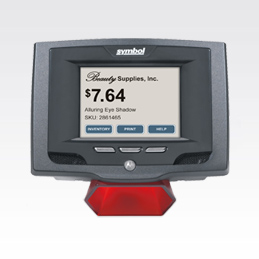
MK500 Micro Kiosk from Motorola EMB
Join the Party at No Charge
Do you need to reach the POS & Auto ID resellers who really drive business—in the most targeted editorial environment, and on the most cost-effective basis?
E-mail Michael
Kachmar for advertising information,
or call 973-270-3284
Did you miss one of our issues and suddenly realize your competitors know more than you do?
Hurry ! Use the links below to catch up :
INTEGRATION
Pallets Can’t Hide from RFID Forklift
The relationship between M/A-COM Technology Solutions (Lowell, MA) and Impinj (Seattle) continues to yield interesting results. Now M/A-COM has rolled out its new sensor-based RFID Forklift System that automatically records an RFID-tagged pallet’s exact storage location during handling and slotting processes, without requiring the operator to initiate manual data collection methods. Impinj’s Speedway Reader, based on UHF Gen 2 RFID, powers the system.
New or existing forklifts can be retrofitted with the RFID Forklift System. It employs an acoustic sensor, broad-beam antenna, and controller logic to identify an RFID pallet tag after it has been loaded onto the forklift. The system then identifies the pallet storage location using its narrow-beam antenna, laser-height sensor, and controller logic to confirm that the specific pallet has been picked up or dropped off at that location. These slotting transactions are fed to the enterprise system via Wi-Fi connectivity.
“Our sensor-based RFID Forklift System automates and streamlines materials movement and management tasks,” indicated Kevin Anderson, Product Line Manager, M/A-COM Technology Solutions. “From increasing inventory accuracy and reducing material losses to processing more pallets per shift while reducing labor costs, this forklift system brings immediate and significant cost savings to material handling and inventory management operations.”

M/A-COM’s RFID Forklift System, Equipped by Impinj
Unlocking Secure Room Key Injection
Hypercom Corporation (Scottsdale, AZ) has introduced its HyperSafe Remote Key System, or HRKS, the industry’s first standards-based remote key injection product that allows retailers to quickly and securely initiate on-site, in-store payment terminal key injection at the POS. This eliminates the long-standing, troublesome need for secure room key injection. So far, HRKS supports Hypercom’s Optimum L4150 and L4250 multi-lane terminals as well as later versions of its Optimum L4100.
HRKS eliminates the need for off-site secure room key injections by incorporating PKI (Public Key Infrastructure) to securely distribute symmetric 3DES keys. The system incorporates the Excrypt KMS9000 key management server from Futurex (Bulverde, TX) with specific functionality developed for Hypercom. The Excrypt KMS9000 system is X509, FIPS 140-2 Level 3, and PCI DSS-compliant. For its part, HRKS meets ANSI X9.24 and Visa PIN Security Guidelines for remote key management.
“Hypercom’s introduction of HRKS caps more than three years of effort by both companies, all towards the goal of creating this more secure key injection solution to help customers save time and money, while delivering the peace of mind that comes from a security design based on ANSI and Visa industry standards for remote key management,” declared Brett Smith, CEO of Futurex, which provides hardware data encryption and security solutions to more than 15,000 financial institutions, retailers, and merchant service providers.
Code
Corner
Torex Retail (Dunstable, Bedfordshire, U.K.) launched its Torex Loyalty package at last week’s NRF Show in New York City. This platform-independent, modular, multi-channel system integrates with the retailer’s existing in-store technology to provide a comprehensive promotions, communications, and analysis package. Torex Loyalty offers retailers the opportunity to proactively drive sales and influence customers’ spending, according to the software company. It allows retailers to collect and store key information about customers and their shopping habits regardless of which POS touch point they prefer to use, physical or virtual. This information helps retailers build an accurate picture of consumer demand, designing promotions precisely tailored to fit the needs of individual customers. With advanced data analysis capabilities, Torex Loyalty can even simulate the overall effects of the campaign on business, allowing retailers to assess potential ROI. Replacing coupon-based systems, the new package can send customers text messages or e-mails on offers of interest. “In today’s trading environment it is crucial that retailers fully understand their customers’ needs, and are able to closely engage with them,” commented Doug Hargrove, Chief Marketing Officer at Torex. “Torex Loyalty provides clear insight into shopping habits and uses this information to predict demand so that retailers can proactively target customers with relevant offers. The system will help retailers drive profits by retaining more customers and increasing average customer spend, while capturing greater share of their market and reducing costs.”
ALLIANCES
Intermec Hears Voices
Voxware, which supplies voice-driven software solutions for warehousing, has joined Intermec’s Honours Partner Program and announced certification for Intermec’s new CN3 rugged mobile computer, which features 3G WAN communications. Intermec’s Honours Program seeks to deliver “highly valued solutions” in data collection, mobile computing, and RFID for mutual customers of Intermec and select ISVs through worldwide partnerships. Based in Hamilton, NJ, Voxware also has offices in the U.K., Belgium, and France.
“We have very high standards when we certify a device for voice operation, including 99.9% recognition accuracy, and we were impressed by the quality and performance of the CN3,” stated Scott Yetter, President/CEO of Voxware. “We are very happy to be the only voice software provider to achieve Honours Partner status, and we are thrilled to team with Intermec to bring the best in open voice technology to the Intermec customer community.”
“We at Intermec are enthusiastic to welcome Voxware as an Honours Program Partner,” added Patrick Byrne, President/CEO at Intermec (Everett, WA). “We pride ourselves in high-quality engineering that delivers strong customer benefit. During 2008 we experienced strong demand from key customers for Voxware-based voice technology, and now our two companies are well-positioned to deliver on the promise of our partnership.”
[Editor’s Note: In keeping with the times, Intermec plans to reduce its global workforce by approximately 150 full-time positions, or 7%. The majority of these reductions will come from selling, general, and administrative areas, according to the company.]
Mobile POS Ordered by Direct Source
Direct Source (Minneapolis), the retail integration and installation services provider, now handles the WebDT 400 Series Handhelds from DT Research (San Jose, CA). The WebDT 430 and 435 are lightweight, rugged POS devices designed specifically to serve the retail and hospitality industries. They offer the largest display screen in the market, programmable touchscreen capabilities, and hot-swappable batteries for continuous use, according to the two parties.
Functions such as magnetic-stripe card reader, barcode scanner, and RFID capability have been integrated, and Microsoft Windows CE is supported. The WebDT 430 features a 4.3-inch LCD touchscreen with an outdoor-viewable display and virtual keyboard. The WebDT 435 features a 3.5-inch LCD touchscreen and physical numeric keypad. In addition, the built-in WebDT Device Manager simplifies the management of multiple devices for large deployments in retail, restaurants, hotels, and entertainment venues. MSRP starts at $999.
“In today’s economy, every company needs to take care of their customers better than ever before,” said Daw Tsai, President of DT Research. “The ability to bring payment processing, order-taking, and ticket scanning to the customer instead of expecting customers to wait in line are all services that make the difference. Our partnership with Direct Source offers companies a complete solution by combining Direct Source’s expertise in services and software support with WebDT’s customizable hardware devices.”
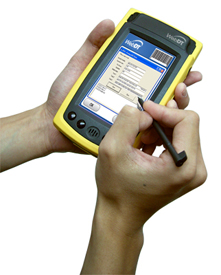
WebDT 430 from DT Research
Key
Advertiser
Links
Be sure to visit these vendors for the latest in channel products and offers for resellers.
POS & Auto ID Distribution
BlueStar
Ingram Micro
POS & Peripherals
pcCashdrawer
Pioneer POS
POS-X
Barcode Printers
Datamax
Cash Drawers
MMF Cash Drawer
Data Collection Terminals
CipherLab
Datalogic
Mobile
Janam Technologies
Integrated Payment Solutions
Datacap Systems
Precidia
Mobile Printing
O'Neil Product Development
Receipt
Printers
Citizen Systems America
Retail Software
InfoTouch
Toshiba TEC
Screen Protection
3M Optical Filters
Thermal Printers
Seiko Instruments USA
HELLO GOODBYE
Soladay Designated as ParTech’s President
PAR Technology Corporation (New Hartford, NY) has named Edwin Soladay as President of ParTech, Inc., PAR’s largest wholly owned subsidiary and supplier of IT solutions to the hospitality industry. Soladay comes to ParTech from Fujitsu Transaction Solutions, where he served as COO. Prior to Fujitsu, he served as President of CRS Retail Systems, one of the leading POS and back-office solution providers.
Soladay replaces Gregory Cortese, who has moved to the position of EVP in the newly formed Office of the Chairman. This group will be responsible for the strategic direction and oversight of the operation of all entities of PAR Technology Corporation. It includes John Sammon, who will continue as Chairman and CEO of the company, Charles Constantino, Vice Chairman of PAR’s Board of Directors, and Ronald Casciano, VP, CFO, and Treasurer.
ParTech also announced several recent Quick-Service Restaurant (QSR) contract wins for its InFusion enterprise software suite and hardware terminals. These include Furman’s, Inc. (Sarasota, FL), Burger King’s longest-running independent franchise, with 31 locations in Florida and Chicago. ParTech also was selected as the complete technology provider for Pamax Management, Inc. (Tulsa, OK), with 30 Burger King locations in its home state. Karen Sammon serves as President of PAR’s Software Solutions Division, with responsibility for InFusion.

Edwin Soladay, President, ParTech
Can Remote Deposit Capture Be Resold?
Mary Winingham will soon find out. Winingham has joined Wausau Financial Systems (Mosinee, WI) as VP for Merchant Services, with the express mission of recruiting ISO’s to sell remote capture solutions, which enable merchants to use scanners to convert paper checks into electronic images for processing. Although remote capture has proven to be one of the fast-growing products in the history of electronic transactions, banks up to now have sold it on their own, primarily to existing business clients. The technology sprang up in the wake of the Check Clearing Act for the 21st Century, passed in 2004 and commonly called Check 21.
An 18-year veteran of the card-processing business, Winingham says remote capture offers resellers the chance to cultivate new markets and earn revenue from both transaction fees and scanner leases. Although remote capture is typically priced on the flat per-transaction basis, rather than on percentage as with credit and debit cards, “it can also carry monthly charges that make it more lucrative for resellers,” according to Winingham. “If you’re selling the right product to the right merchant, the value is truly there and the merchant readily sees it,” she promised.
Now Winingham is directing an effort to give WebDDL, Wausau’s remote capture portal for financial institutions, some added features that should appeal to ISO’s, such as tracking, reporting, and management functions tailored to their needs. The product will be “bank-agnostic,” she noted, and ready to go by March. Working with Epson America (Long Beach, CA), which manufactures check scanners, she has already started recruiting ISO’s at lunch-and-learns in locations around the U.S. Maybe interest in POS resellers won’t be far behind, given their recent desirability to purveyors of payment processing solutions.
Channel Factoid
Last year, PandaLabs, Panda Security’s malware analysis and detection laboratory, detected an average of 35,000 malware samples each day, 22,000 of which were new infections. By the year’s end, the total count of malware threats detected by PandaLabs exceeded 15 million. This number surpassed initial projections by over 5 million and resulted in Panda’s detection of more malware in the first eight months of 2008 than in the company’s previous 17 years combined. The majority of this new malware (68%) was classified as “Trojans,” meaning it was designed to steal confidential data such as bank accounts, passwords, and the like. Normally these Trojans run silently in the computer’s memory and only activate when the victim accesses certain bank Websites. Also growing in number: rogue antivirus programs, which trick the computer user into believing they have been infected by dangerous malware and offer paid solutions to supposedly remove the infection. We’ve all seen those.
STANDARDS
New Retail Guidelines Crafted by ARTS
The Association for Retail Technology Standards (ARTS), the standards division of the National Retail Federation (Washington, DC), has completed several new efforts of interest to retailers, OEMs, and integrators. The first, Web Services Point of Service (WS-POS), seeks to allow retailers to share POS peripherals such as printers, scales, and scanners across multiple POS terminals and platforms through the power of Service-Oriented Architecture (SOA). When WS-POS Version 1.0 completes its Public Review cycle and all industry feedback has been evaluated by the work team, it will then be presented to the ARTS Technical Committee for vote. The process should take several months.
“In the meantime, work continues on UnifiedPOS 2.0, which represents a fresh look at how to interconnect POS peripherals in an environment based upon the industry advances in software and hardware technologies,” reported Paul Gay, representing Epson and Chair of the UnifiedPOS Technical Committee. “The work to maintain and enhance the now 10-year-old API-based UnifiedPOS standard continues with Version 1.13 of the specification scheduled for release in the first quarter of 2009. User feedback, POS device feature enhancements, and clarification of the standard are the focus of the committee’s commitment to offer legacy support.”
Perhaps most significantly, UnifiedPOS 1.13 includes upgrades to POS printing to better facilitate the creation of form-like receipts and documents that require drawing of continuous “ruled lines,” as well as additional two-dimensional barcode symbologies for Data Matrix, QR Code, Micro QR Code, Aztec, and Micro PDF-417. In addition, it includes changes to the Tone Indicator device to allow “melody” tones or fixed two-tone sequences (“siren tones”) to be produced, enabling better feedback for operators, and presumably, more pleasant customer experiences.
ARTS also completed and released Version 6.0 of its standard Retail Data Model with an accompanying Data Dictionary. Two years in development, Version 6.0 features more than 100 enhancements and has been coordinated with the ARTS Data Warehouse Model and the popular ARTS POSLog XML schema to capture all the data recorded at POS, be it in-store, Web, or kiosk. Available to the public, the new ARTS Data Dictionary provides standard retail data names with descriptions for use in XML schemas and messages, as well as search and sort functionality.
For more information on these programs, visit www.nrf-arts.org.
PinPoint Media
All Rights Reserved


